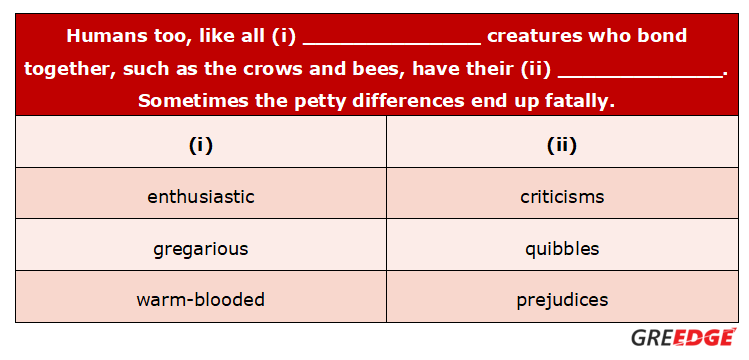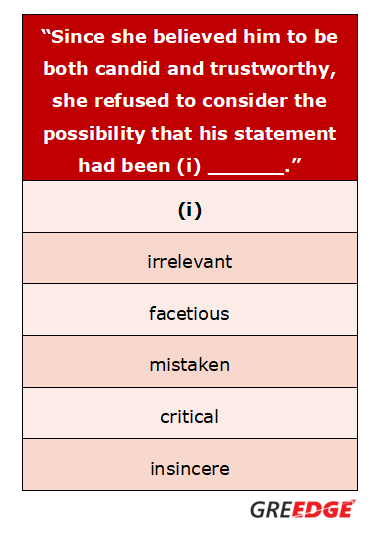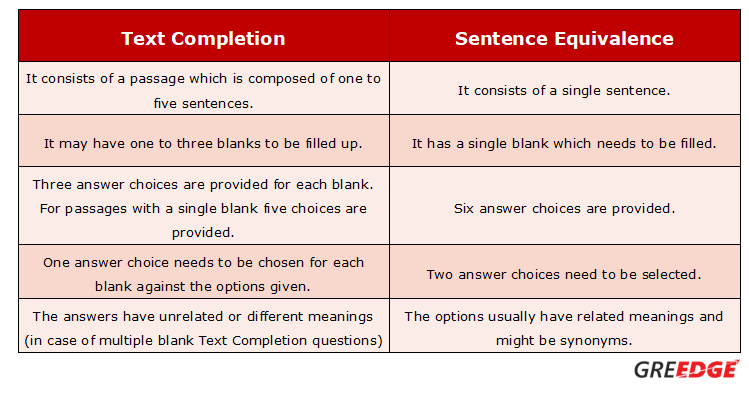GRE Text Completion: Tips & Strategies
The GRE Verbal section may intimidate you, and what might be even more intimidating is its highly advanced vocabulary. While text completion type questions may seem like innocuous fill-in-the-blank type problems, one must note that the options can often be highly confusing. Not knowing the right meanings of the words or their synonyms and antonyms might lead you to pick the wrong answer choice(s). While the single blank questions are comparatively easy to maneuver, questions with multiple blanks can indeed be tricky – more so because there is no concept of partial marking on the GRE. You get awarded marks for that question only if you attempt the correct answers for each blank. So is there an effective guide to simplifying GRE text completion type questions? You bet there is! Read on to find out more about this section, the different types of questions you’ll be facing and how to get them right – every single time!
Download our eBOOK on “Ultimate Guide to crack GRE Verbal“
All about GRE Text Completion:
The GRE text completion section assesses how you interpret and evaluate information presented to you based on your reasoning skills. They do this by omitting critical words from short passages which you need to fill up by using the remaining information in the passage as a basis to create a logical and meaningful whole.
A typical GRE text completion question features a sentence or short passage where one, two or three words are left blank. Your task is to pick the right word from the choices given and make the passage meaningful.
You can expect approximately 12 text-completion questions in total with roughly 6 text-completion questions in each sub-section of the GRE Verbal.
GRE text-completion questions can be of three types:
- Single-blank: These questions have a single blank to be filled up. For sentences or passages with a single blank, you will have to choose the right option from five given words. You can expect four single blank questions in total (2 per section)
- Double-blank: Double blank text completion questions have two blanks to be filled up. You will have to choose the right answer from three given options. You may expect around four to five double blank questions. (2-3 per section)
- Triple-blank: Triple blank text completion passages have three blanks which need to be filled. Three options will be given from which you will have to pick up the right word and you can expect roughly three to four triple blank questions. (1-2 per section)
It is important for you to remember that you have to choose the right answer for every blank for questions with either a double blank or a triple blank to earn a credit. You do not earn any credit for partially correct answers. Also, a double and a triple blank question counts as a single question even though the question passage has multiple blanks.
Tips to crack GRE Text Completion:
One of the most common mistakes candidates make on this section is to focus only on vocabulary building. Now don’t get me wrong here – a great vocabulary is, in fact, one of the pillars of your GRE verbal prep; but it’s not the only one! There’s quite a lot of critical thinking involved in answering Text Completion questions with respect to which word (or words) make the passage meaningful and rational, i.e., contextual usage of words.
Let us consider the following examples for a better understanding:
Now, the tendency of test takers is to link the first two blanks and then find out the right word for the third blank. So, you might think that because the author is so ‘verbose’ that his work becomes ‘inaccessible’. And then, therefore you quickly link that to ‘lack of coherence and lucidity’. However, this is the point where you need to use your critical thinking and reasoning skills.
If you notice that there is a ‘but’ in the middle of the sentence, that’s your clue that it’s a turning point for the sentence, and the second part of the sentence is likely to take on a different tone from the first. Also, the term ‘knowledgeable critics’ appear and you need to think about why and what critics would point out in the author’s work. Hence, if you logically analyze this sentence, you will find that because of the author’s ‘verbosity’ people, in general, find his work ‘inaccessible’, but critics, because they are experts and know the topic really well, find this to be the most ‘succinct’ piece of work in the field’.
Thus, the answer to this question goes like this:
Because of the author’s (i) verbosity, many readers consider his latest work (ii) inaccessible but, in reality, as many knowledgeable critics point out the piece (iii) is the most succinct on the subject.
Therefore, do not jump into conclusions and make the wrong choices! But what must you do to identify the correct answers? Well, there are some tips and tricks to master text completion questions and handle them like a pro.
Tip 1- Break the sentence:
Text completions passages can be lengthy and are difficult to assimilate at one go. You might as well get lost in the maze of words by looking at the whole passage and attempting to answer the question. One of the ways to handle a text completion question is to break the text into parts in a way that is easy for you to understand. So, before you consider any of the choices given, break the passage into smaller, easily understandable parts and consider each part at a time. You will then find it easy to link these smaller parts to get the bigger picture.
In order to understand this, let us consider an example:
In order to solve this, break this passage into smaller parts in your own words. Doing so will make it easier for you to find the right word for each blank.
(i) Let’s take a look at the first part of the sentence:
“For centuries now, cancer has (i) ___________ scientists.”
Since confused would be the right word here, look for the option that is closest in meaning to confused, which in this case is confounded.
Great! We now know the answer to one of the blanks!
(ii) Let’s move on to the second part of the passage now:
“Unlike most microbes, cancer can spread to the (ii) __________ organism.”
If ‘whole’ is the word you have in mind, you’re absolutely on the right track! Now, look for the option that is closest in meaning to ‘whole’. This is an easy one – entire!
(iii) Now for the 3rd and final part of the passage:
“making it very difficult for scientists to find a way to attack the cancer without (iii) _________ any of the affected organs.”
What words are you thinking of? Damaging? Harming? Destroying? Locate the GRE word for that and you’ll have successfully answered all three blanks correctly and earned your score
Download our eBOOK on “How to score 160+ in GRE Verbal by Learning GRE Words?“
In this case, the word you’re looking for is ‘impairing’ which essentially means the same as harming or damaging. Hence, here’s what the completed passage should look like:
For centuries now, cancer has (i) confounded scientists. Unlike most microbes, cancer can spread to the (ii) entire organism, making it very difficult for scientists to find a way to attack the cancer without (iii) impairing the functions of any of the affected organs.
If you would have tried to choose the right words without breaking down the sentence into smaller parts, you were very likely to choose ‘intrigued’ instead of ‘confounded’ for the first blank. The word ‘intrigued’ means ‘to arouse curiosity or to fascinate’ and considering that the passage talks about scientists finding it difficult to figure out how to attack the cancer cells, the word ‘confounded’ fits the blank better. The word ‘corrupted’ means ‘to act dishonestly for personal or monetary gains’. This word does not fit the blank because cancer being a disease cannot corrupt scientists.
On the same lines, you were very likely to choose ‘eradicating’ for the third blank which means to destroy completely. However, we need to understand that the passage talks about the scientists trying to eliminate cancer and not the organs. The word ‘eradicating’ therefore, changes the context of the passage completely. The right word choice is, therefore, ‘impairing’, which translates to ‘having an adverse effect’ on the organs.
Tip2- Check for word use and idiom problems:
GRE Text Completion uses words as well as idioms to express ideas which may sound and appear very tricky. You must make sure you understand how ideas have been expressed as phrases and eliminate the options or choices that result in the sentence appearing puzzling or awkward. Read the complete sentence and if it sounds wrong to your ear then maybe it is not the right answer.
Let us consider an example:
In the case of the second blank, we can take a hint from the last line of the passage ‘sometimes the petty differences end up fatally’. This indicates that even though the social bonding in crows, bees, and humans is strong, sometimes they also quarrel amongst themselves and this sometimes can lead to loss of life. The word ‘criticism’ means ‘expression of disapproval’ which does not lead to any fatalistic outcome and therefore does not fit the bill. The answer choice ‘prejudice’ means ‘preconceived notion not based on any reason’. Since the comparison is made between humans and animals, this word will not fit because prejudices exist only in humans and not in animals. This leads us to the answer ‘quibble’ which refers to an argument. So, the passage with the correct words goes like this: In this passage, the phrase ‘creatures who bond, such as the crows and bees, humans too have …’ provides a vital clue regarding social behavior of these species for the first blank. The word ‘enthusiastic’ means showing interest and does not really relate to social behavior. Also, the other option ‘warm-blooded’ refers to birds and mammals and therefore does not fit the context, as the passage includes bees, too. This leads us to answer choice ‘gregarious’ which means being sociable.
Download our eBOOK on “Learn GRE Words with TV Series & Cartoons Series“
Humans too, like all (i) gregarious creatures who bond together, such as the crows and bees, have their (ii) quibbles. Sometimes the petty differences end up fatally.
Tip 3- Consider all the answer choices:
Always read the entire passage and don’t choose options in haste. Most of the times the difference between the options might be very subtle and you might end up choosing a weaker option when a stronger one is already provided.
Now, in the options‘insincere’, ‘facetious’, and ‘mistaken’ all indicate a general sense of falseness; however, it is the word insincere which directly relates with the idea of trust and belief.If you examine this sentence carefully, then three keywords emerge from the passage which provides us a clue about the answer. The words ‘since’, ‘believed’ and ‘refused’ give us an idea that because of her belief, she refused to think that he might be lying or something that is false.
So, we hope these examples helped you to understand how critical thinking skills paired with knowledge of vocabulary can go a long way in selecting the right answer choice. By practicing text completion questions using these techniques, you can easily achieve a 160+ in the GRE’s Verbal section.
GRE Text Completion versus Sentence Equivalence:
Now that you have a fair idea on how to go about answering text completion questions, you must be wondering about the difference between text completion and sentence equivalence. Text completion and sentence equivalence are both types of fill-in-the-blank questions. However, apart from that similarity, there are significant differences between the two. Let us have a look at them:
Effective Vocabulary building techniques:
By now you must have understood that the keys to cracking GRE Verbal are developing critical thinking skills and a strong vocabulary with about 3,500 GRE words, their usage and application to learn! You can start off with reading different articles and pick up words which are unfamiliar to you and check their meanings.
Download our eBOOK on “High Priority GRE Word List“
Memorizing is one thing and usage is another. You may memorize a whole lot of words but you may not really be aware of the context in which these words are used. Therefore, while learning words you must also learn where to use them. In order to do this, construct your own sentences using the words you have just learned. This is where WordBot can really help you out! Try it out now – it’s completely free to use!
We hope this article provided you with smart ways to crack GRE Text Completion questions. All the Best!














